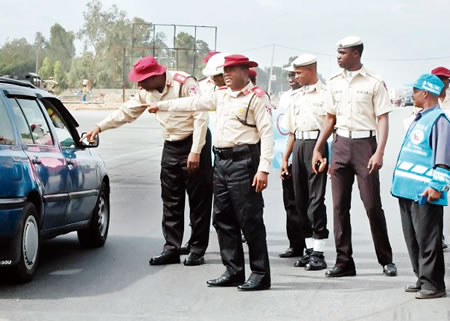On a daily basis, Nigerian motorists are stopped on the road while their vehicle papers are demanded for to be checked by a myriad of law enforcement agencies, especially those having to do with vehicles and road safety. KOLA MUHAMMED and ADEOLA OTEMADE examine this overlapping role and the right of the agencies to check vehicle papers.
DOYINSOLA Opeoluwa (not real name) got in his car and headed for his office in order to meet up with an 8 o’clock meeting. The luxury of having a car meant that he could get to his place of work in a matter of minutes without having to worry about the slow pace of commercial vehicles.
On this fateful morning, however, he was stopped by the police and his vehicle papers were requested for. He thought it was the normal routine and would be done in a matter of minutes since his papers were up to date. He was wrong; he was not able to leave until after about an hour.
“They were going through my papers as if it was written in French. They asked for papers that I didn’t think concerned them, even up to my tinted glass permit. I was so infuriated that I wondered who should check what among the law enforcement agencies,” Opeoluwa fumed.
Just like this experience, the dilemma and problems motorists face never seem to cease at the hands of these agencies, be they officers of the Federal Road Safety Corps (FRSC), Vehicle Inspection Operation (VIO), Nigeria Customs Service or The Nigeria Police (NPF). People plying major roads also encounter paramilitary outfit officers. However, what is unclear to many is the jurisdiction under which each of these agencies operates, especially when it comes to vehicle inspection and highway security.
Investigations by Sunday Tribune reveal that each of the paramilitary agencies has its own jurisdiction, where it is expected to operate without necessarily interfering with one another. This is also in addition to numerous checkpoints where motorists are forced to slow down for checking.
Commercial drivers, including those employed by private individuals, have a whole lot of stories to tell. A driver employed by a private school, who pleaded to remain anonymous, related his experience to Sunday Tribune.
“I drive a bus for a school. On this fateful day, I was driving the school bus with children inside back to their various homes after school hours. On our way, we had a flat tyre, so I parked in order to change it and also get it repaired. That was how some VIO people accused me of parking illegally. They saw the kids in the bus; they saw what was on the ground, yet they maintained that the bus was not parked properly. I was charged and asked to pay N20,000 fine. They didn’t release me until the owner of the bus came to meet us there and went to pay the money.
“These people, the police, the road safety and VIO officers and other bodies just extort money from people illegally with their outrageous fees for issues that are not even worth it,” he added.
A commuter who simply identified himself as Yemi shared his experience when he relocated from Ibafo in Ogun State to Ede, Osun State.
“I relocated to Ede from Ibafo last year. So, I used my mum’s car in transporting myself. We left quite early with the driver and as we passed the toll gate very close to the Oyo- Osun boundary, we were stopped by some FRSC officers. Initially, they said we were meant to use a bigger truck in transporting the loads. Later, they checked the driver’s licence and the vehicle papers only for them to say the papers of the car had expired which was not so, as it was going to expire two days from that time. We were asked to pay N13,000 before we could be allowed to move the car and proceed on our journey,” he narrated.
An essential worker who had to travel around due to the nature of his job narrated the sheer time-wasting tactics of security agent, especially when it was not in their jurisdiction to take up the issue.
“Due to the nature of my job as a journalist, I usually close late from work. On this particular day, soldiers were stopping cars at night, asking for driver’s licence and vehicle particulars.
“So, the car I used that day belonged to the company I work with, and they were yet to renew the insurance papers. However, I had all other particulars complete. I was delayed because of the insurance papers that had expired. I explained to them that it was not my job to renew the papers and as soldiers, I didn’t think it was the duty of the Nigerian Army officers to ask questions on vehicle insurance, once they could ascertain the ownership of the vehicle and legitimacy of the driver. Everything fell on deaf ears and they really wasted my time. Eventually though, I was allowed to go,” the journalist said.
Aina Damilare, another road user, expressed his concerns and frustration on the issue while speaking with Sunday Tribune.
According to Damilare, “It is tiring with all the duplication of duties by security agents on the roads. I don’t think the police have the right to check vehicle papers, but they can conduct ‘stop and search,’ if they suspect that a car might have been stolen or might have some incriminating things in it. It should be the duty of the Federal Road Safety Commission and VIO to check papers and vehicles for road worthiness. But if we tell some officers that it is not in their capacity to act on some these issues, they become belligerent and even take out the aggression on us. So, it is better to keep mute and just be obedient.”
However, in the attempt to establish the fact of the matter over the rights to check vehicle papers, Sunday Tribune spoke with separate agencies over the matter.
According to Mrs Adeola Esuoola, a worker at the state Secretariat Licencing Office in Ibadan, “the FRSC, the VIO and the police have rights to check the vehicle papers. The legitimacy of the VIO lies in their right to check and license vehicles for road worthiness. The FRSC also possesses the right because not only does it they ensure that highways are safe, they also checks for vehicle registration and insurance, driver’s licence and enforce traffic laws. There are different levels to what each paramilitary group can check.”
The Assistant Protocol Officer for the FRSC, Eleyele Command, Ibadan, Oyo State, Zainab, remarked that the FRSC has the right to check papers.
“According to our FRSC Establishment Act, we are in charge of roads. We have the highway codes; inside the highway codes, there are guidelines to check to ensure that motorists and other road users are sane enough to be on the road, and if the vehicle is road-worthy.
“We check the particulars to ensure that the vehicle is not stolen, because we have a database where all vehicles are registered. So, if a car is stolen, it is easy for us to detect that it is stolen. In situations where a vehicle’s number does not tally with the name on our database, we have provision for vehicle verification scheme, because everyone who owns a vehicle must register it. It is totally within our jurisdiction to check for vehicles’ papers,” she explained.
Speaking to Sunday Tribune, the Police Public Relations Officer (PPRO), Oyo State police command, Olugbenga Fadeyi, commented that the police officers who stop vehicles on the road are totally within their rights to do so.
“As the police, we ensure the safety of lives and properties. It is not uncommon for vehicles to be stolen and being on the highway, we have the right to stop vehicles, ask for their papers and verify if the drivers are the owners of the vehicles. People also transport contraband goods.
“That is why it is standard procedure for policemen to ask drivers to open the booths of their vehicles. We ensure that illegal activities are curbed and one of the ways to achieve this is to stop vehicles, check their papers and confirm that nothing prohibited by the law is being perpetrated.
“On whether police officers could detain people who run foul of required papers and certifications, the police spokesman related that it is within the rights of police personnel to question road users on whether they are fit to ply roads and abide by necessary regulations. In cases where there are defaulters, they are handed over to appropriate authorities, depending on the nature of the case,” he explained.
A Vehicle Inspection Officer who spoke to Sunday Tribune on the condition of anonymity revealed that VIOs work with Vehicle Inspection Service (VIS) and are a directorate under the ministry of transportation.
He said: “Our primary duties are to inspect and certify vehicles for road worthiness, train and test drivers for driver’s licence eligibility which would be issued by the FRSC, and also certify driving schools which train prospective drivers.”
From all the explanations, it is not likely the dilenma and problems Nigerians face on the road will end soon. Motorists will have to endure the nightmare of giving in to uniform people who genuiely carry out their lawful duties and those who hiode under the law to demand for Partikolas instead of vehicle particulars.
YOU SHOULD NOT MISS THESE HEADLINES FROM NIGERIAN TRIBUNE
Plan To Destabilise Nigeria Is Real — SSS
THE State Security Service (SSS), on Friday, insisted that there were plans by some unnamed notable personalities in the country to subvert the nation. In a statement made available to newsmen in Abuja by its spokesperson, Dr Peter Afunanaya, the service pointed out that part of the orchestrations of the plotters was to engage in divisive acts as well as use inciting statements to pit one group against another in the country…
More Heads To Roll In UNILAG •Babalakin, Ogundipe Trade Words, Resumption In Jeopardy
MORE top officials of the embattled University of Lagos (UNILAG) are to be axed for alleged financial recklessness and mismanagement which consumed the institution’s Vice-Chancellor, Professor Oluwatoyin Ogundipe on Wednesday, the Governing Council, disclosed on Friday…
INEC Seeks Stakeholders Collaboration In Instituting Electoral Transparency
The Independent National Electoral Commission (INEC) has urged stakeholders in the electoral process to join the commission in deepening the use of technology and instituting a regime of transparency in electoral process. INEC Chairman, Prof. Mahmood Yakubu, represented by Mr Festus Okoye, INEC National Commissioner and Chairman, Information and Voter Education Committee, made the call at a virtual…
How Bandits, Terrorists, Other Criminals Get Their Weapons —Retired Col. Majoyeogbe, Ex-Commandant, Army Intelligence School
Colonel Olanipekun Majoyeogbe retired from the Nigerian Army after holding various posts, including Commandant, Nigerian Army Intelligence School and Commandant, SSS Training School. In this interview by SUYI AYODELE, the graduate of English from the Obafemi Awolowo University (OAU), Ile Ife, speaks on various issues bordering on the Nigerian security situation…
National Assembly Acting Clerk Advocates E-Parliament
Acting Clerk to the National Assembly, Mr Olatunde Amos Ojo, has again restated his determination to transform the National Assembly “for better deliveries of constitutional responsibilities that is of international standard in lawmaking, representation and oversight…”
WATCH TOP VIDEOS FROM NIGERIAN TRIBUNE TV
- Relationship Hangout: Public vs Private Proposals – Which Truly Wins in Love?
- “No” Is a Complete Sentence: Why You Should Stop Feeling Guilty
- Relationship Hangout: Friendship Talk 2025 – How to Be a Good Friend & Big Questions on Friendship
- Police Overpower Armed Robbers in Ibadan After Fierce Struggle






